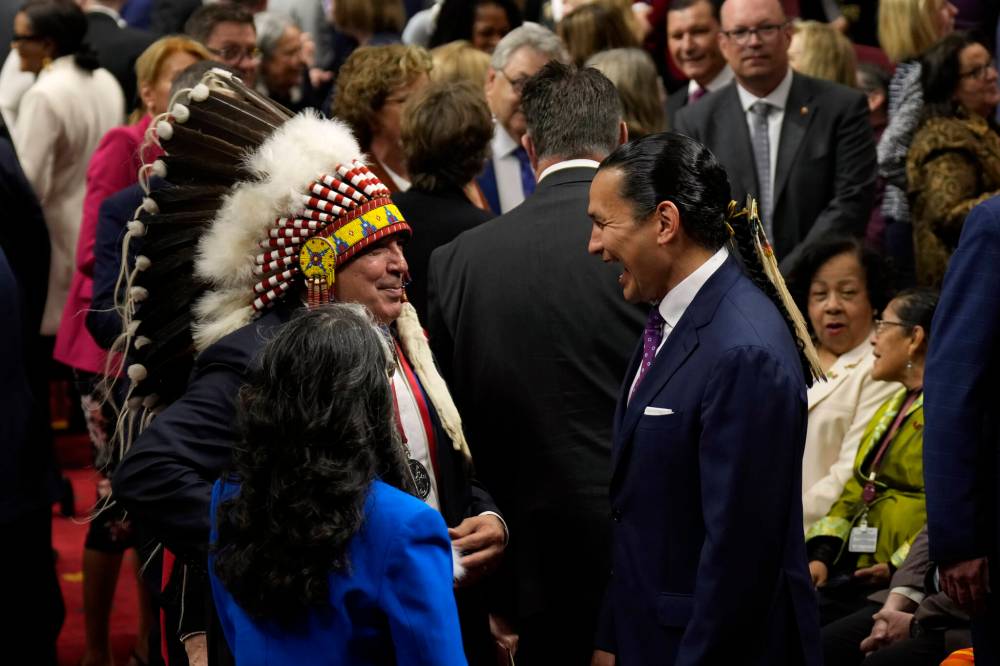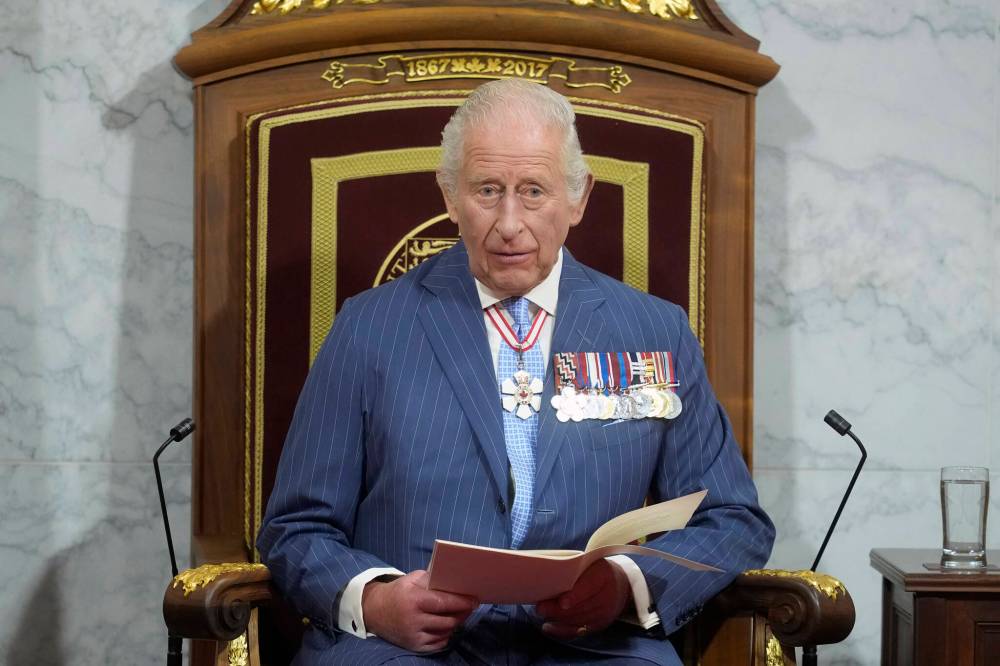King’s speech proves Crown, treaties still relevant
Advertisement
Read this article for free:
or
Already have an account? Log in here »
To continue reading, please subscribe:
Monthly Digital Subscription
$0 for the first 4 weeks*
- Enjoy unlimited reading on winnipegfreepress.com
- Read the E-Edition, our digital replica newspaper
- Access News Break, our award-winning app
- Play interactive puzzles
*No charge for 4 weeks then price increases to the regular rate of $19.00 plus GST every four weeks. Offer available to new and qualified returning subscribers only. Cancel any time.
Monthly Digital Subscription
$4.75/week*
- Enjoy unlimited reading on winnipegfreepress.com
- Read the E-Edition, our digital replica newspaper
- Access News Break, our award-winning app
- Play interactive puzzles
*Billed as $19 plus GST every four weeks. Cancel any time.
To continue reading, please subscribe:
Add Free Press access to your Brandon Sun subscription for only an additional
$1 for the first 4 weeks*
*Your next subscription payment will increase by $1.00 and you will be charged $16.99 plus GST for four weeks. After four weeks, your payment will increase to $23.99 plus GST every four weeks.
Read unlimited articles for free today:
or
Already have an account? Log in here »
After meeting King Charles, Manitoba Premier Wab Kinew said the two spoke about wildfires in the province, the Canadian economy, and climate change — but then the monarch said something surprising.
“We need Indigenous wisdom,” the King told Canada’s only First Nations premier.
Indeed.

ADRIAN WYLD / THE CANADIAN PRESS
Manitoba Premier Wab Kinew (right) speaks with former Assembly of First Nations chief Perry Bellegarde ahead of Tuesday’s throne speech.
The King was in Ottawa Tuesday to deliver Prime Minister Mark Carney’s first throne speech in a move viewed by most as a statement against U.S. President Donald Trump. A statement about Canadian independence, sovereignty and to underscore the nation is part of the British Commonwealth.
In other words, anyone wishing to turn the country into the 51st state may want to consider this.
Inviting the King to deliver a speech describing the mandate of the Carney government is political theatrics but it’s also sure to be more than a poke to Trump, who is known to admire and envy the power of the monarchy.
The throne speech to open the 45th session of Parliament is full of meaning — maybe more than many realize. The speech represented Carney’s attempt to further break from the legacy of Justin Trudeau, for instance.
It marks the first time a monarch has delivered the speech since Queen Elizabeth in 1977. The King’s participation meant Gov. Gen. Mary Simon, who was appointed by Trudeau, didn’t read the speech.
The replacement of Canada’s first Indigenous Governor General with the King is also worth noting — but more on this in a minute.
The speech began with a baffling moment when a British monarch acknowledged Indigenous ownership of the land he stood on by saying: “We are gathered on the unceded territory of the Algonquin Anishinaabeg people.”
Most nonsensical is how this didn’t immediately solve the decades-old land claim by the Algonquin Anishinaabeg over 117,500 acres in eastern Ontario, which includes Ottawa, but I digress.
This does bring me, however, to the most significant result of the King’s speech.
As my Métis lawyer, colleague, and friend Bruce McIvor wrote in his latest book, Indigenous Rights in One Minute, Canadian courts have, over the years, been moving towards a basic principle: governments in Canada act as a proxy for the Crown when it comes to Indigenous and treaty rights.
Years ago, treaties were signed between First Nations and the British Crown — defining a unique and special relationship held by no one else in this country. Even after Confederation in 1867, this is still the case — with the Honour of the Crown existing in perpetuity as the guidepost for non-Indigenous actions in the relationship.
In all matters referring to Indigenous and treaty rights, therefore, the Crown’s representative must be present and involved, which has led to some complicated moments between First Nations and the federal government.
The problem is the federal government doesn’t consult the Crown or Gov. Gen. Mary Simon when it attempts to define Indigenous and treaty rights. It almost always makes decisions on its own — a process that leads to endless and costly marches into legal arenas and the Supreme Court where First Nations usually win.

ADRIAN WYLD / THE CANADIAN PRESS
King Charles delivers the speech from the throne in the Senate in Ottawa on Tuesday.
In response to this problem, the courts have, for years, leaned into the idea the federal government has replaced the role of the Crown, with the monarchy positioned as largely ornamental.
When King Charles read the federal government’s speech, it proved the Crown is not irrelevant but more relevant than ever — and, in fact, the legitimate authority over the federal government.
As former national chief Perry Bellegarde remarked in an op-ed written for the Globe and Mail, the King giving the throne speech “reaffirms something we have always known: the Crown is not merely symbolic. It is central to the treaty relationship that founded Canada.”
This means the monarch should meet with First Nations leaders — something chiefs demanded this week — but King Charles did not meet with them.
It also means King Charles shouldn’t meet with those who hold no legitimate authority to speak on behalf of Indigenous and treaty rights, like leaders of national Indigenous lobby groups such as the Assembly of First Nations or others — but he did.
The misunderstanding about the role of the monarch in this country leads to a lot of odd moments, bad looks, and a displacing, inappropriate, and even illegal treatment of treaties and Indigenous rights in the country — not to mention a lot of wasted time.
Carney’s use of the King to battle Trump reminds the country that the Crown is the ultimate Big Brother of the federal government and, at the same time, so are the treaties the country’s older sibling negotiated with First Nations.
Even the King seems to realize Indigenous wisdom is needed in all facets of this country. One hopes Carney and his government will take advantage of that wisdom in building the economy, working to protect the environment, and protecting Canadian sovereignty, too.
niigaan.sinclair@freepress.mb.ca

Niigaan Sinclair is Anishinaabe and is a columnist at the Winnipeg Free Press.
Our newsroom depends on a growing audience of readers to power our journalism. If you are not a paid reader, please consider becoming a subscriber.
Our newsroom depends on its audience of readers to power our journalism. Thank you for your support.










